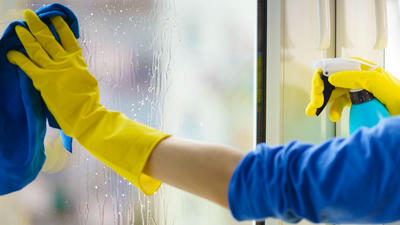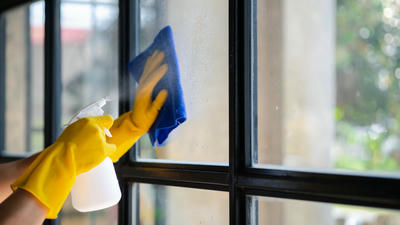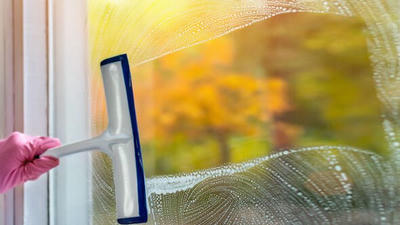Streak-Free Windows: The Ultimate Cleaning Guide



Keeping your windows clean and streak-free is essential for maintaining a bright and inviting home. Windows not only enhance curb appeal but also allow natural light to flood your living spaces. However, achieving sparkling, streak-free windows can be a daunting task.
Enhancing Aesthetics: Clean windows improve the overall appearance of your home, both inside and out. Streak-free windows create a clear view and contribute to a polished look.
Natural Light: Dirty windows can block natural light, making rooms feel dim and less inviting. Clean windows allow more sunlight to enter, brightening your space.
Energy Efficiency: Maintaining clean windows can improve energy efficiency. Dirt and grime can obstruct the view and the effectiveness of window coatings designed for insulation.
Preventing Damage: Regular cleaning helps to prevent the build-up of debris that can contribute to mold, mildew, and permanent stains. This can extend the lifespan of your windows.
Curb Appeal: Clean windows enhance curb appeal, which is especially important if you're preparing to sell your home.

One of the most frustrating issues when cleaning windows is ending up with streaks. Streaks can form from using the wrong cleaning products, dirty rags, or insufficient drying techniques.
Smudges can be caused by fingerprints, cooking splatters, or pet nose marks. These are particularly noticeable on glass and can detract from the clean look you desire.
If you live in an area with hard water, calcium deposits can build up on your windows. These water spots can be tough to remove and may require special treatment.
Windows attract dust and dirt, especially if they are located near high-traffic areas or outdoor pollution sources. Regular cleaning is essential to keep them clear.
To achieve the best results, it’s essential to have the right tools and supplies on hand. Here’s a list of what you’ll need:
Squeegee: A high-quality squeegee is a must for achieving streak-free results. Look for one with a rubber blade for better performance.
Microfiber Cloths: These cloths are highly effective for cleaning and drying glass surfaces without scratching.
Scrub Brush: Use a scrub brush for removing dirt and grime from window sills and frames.
Bucket: A bucket is essential for mixing your cleaning solution and rinsing tools.
Extension Pole: For hard-to-reach windows, consider using an extension pole to attach your squeegee.
Commercial Window Cleaners: Many commercial products are available that are specifically designed for window cleaning. Look for those that are ammonia-free to prevent streaking.
DIY Cleaning Solutions: You can make your own window cleaning solution using common household ingredients. Here are a couple of effective recipes:
Vinegar and Water Solution: Mix equal parts white vinegar and water in a spray bottle. This solution is effective for cutting through grime and leaving glass streak-free.
Dish Soap Solution: Add a few drops of mild dish soap to a bucket of warm water. This solution is excellent for removing heavy dirt before squeegeeing.
Lint-Free Paper Towels: While microfiber cloths are preferred, lint-free paper towels can also be effective in a pinch.
Old Newspaper: Some people swear by using old newspaper for drying windows, as it can produce a streak-free shine.
Rubbing Alcohol: For particularly tough spots or sticky residues, a small amount of rubbing alcohol can help break down grime.
Bucket Ladder: If your windows are high up, ensure you have a good ladder or bucket ladder that is stable and safe.

Cleaning windows may seem like a straightforward task, but following a systematic approach can help you achieve the best results. Here’s a detailed step-by-step guide:
Clear the Workspace: Remove any obstacles from the area around the window, including potted plants, furniture, or decorative items.
Dust Window Frames and Sills: Use a microfiber cloth or scrub brush to dust off the window frames and sills to remove any dust and debris.
Apply the Cleaning Solution: Spray or apply your cleaning solution generously on the window surface. Ensure adequate coverage but avoid over-soaking surfaces.
Scrub the Glass: Use a clean microfiber cloth or scrubber to wipe down the window, paying special attention to corners and edges where dirt tends to accumulate.
Start at the Top: Begin squeegeeing from the top of the window and work your way down. Use a consistent, firm pressure while dragging the squeegee down.
Wipe the Blade: After each pass, wipe the blade of the squeegee with a clean cloth to prevent transferring dirt back onto the glass.
Overlap Your Strokes: Slightly overlap each stroke to ensure complete coverage and prevent streaks.
Dry the Edges: After squeegeeing, use a microfiber cloth or paper towel to wipe any remaining water from the edges and corners of the window.
Clean Window Frames and Sills: Wipe down the frames and sills with a damp cloth to remove any dirt or cleaning solution that may have splashed.
Inspect for Streaks: Step back and inspect your windows for any streaks or missed spots. If necessary, do a quick touch-up on those areas.
Clean Your Tools: After finishing your cleaning, rinse out your tools and wring out any excess water.
Store Supplies Properly: Store your cleaning supplies in a safe, dry place for easy access next time.
Avoid Rainy Days: Cleaning your windows right before rain can lead to dirty and streaky windows again quickly.
Monitor Humidity: High humidity can make windows more prone to streaking when cleaning. Pick a day with moderate humidity to clean.
Don’t Clean in Direct Sunlight: This can cause cleaning solutions to dry too quickly and lead to streaks.
Avoid Abrasive Materials: Never use steel wool or harsh scrubbers that can scratch the glass. Stick to soft cloths and gentle cleaning tools.

For windows affected by hard water stains, consider the following techniques:
Vinegar Soak: Soak a clean cloth in vinegar and place it over the stained area. Let it sit for an hour before scrubbing and rinsing.
Baking Soda Paste: Create a paste with baking soda and water, apply it to the stained area, and gently scrub before rinsing.
Rubbing Alcohol Solution: For greasy fingerprints or tough smudges, use a mixture of rubbing alcohol and water to spot clean.
Dish Soap Solution: A few drops of dish soap in warm water can effectively break down oily residues.
If you notice mold or mildew around window frames, it’s crucial to act quickly:
Bleach Solution: Mix a solution of one part bleach to 10 parts water. Use this to spray the affected areas, allowing it to sit before scrubbing and rinsing.
Vinegar: For a more eco-friendly approach, use vinegar to spray directly on moldy areas and scrub away.
Thorough Inspection: Perform a thorough inspection of windows for any damage or needs for repairs, including seals and screens.
Clean Screens: Remove screens and wash them with soap and water to maintain clarity.
Block UV Rays: Consider adding window films or UV-blocking shades to prevent sun damage and fading inside your home.
Inspect for Bugs: Check for dead insects or webs that may have accumulated in the window tracks.
Clear Debris: Clean out gutters and downspouts to prevent overflow which can lead to water stains on windows.
Inspect Seals: Look for cracks or gaps in window seals that need caulking for better insulation during winter.
Inspect Frost Buildup: Regularly check for frost accumulation which can impair visibility and affect your windows.
Use a De-Icer: If you have exterior windows affected by frost or ice, consider using a de-icer to maintain visibility.
Vinegar: A versatile cleaner that can remove dirt and grime while acting as a natural disinfectant.
Baking Soda: Acts as a gentle abrasive for scrubbing and can help with tough stains.
Essential Oils: Add essential oils like tea tree or lavender to your homemade cleaners for a pleasant scent and added antibacterial properties.
Reusable Cloths: Use washable microfiber cloths instead of disposable paper towels to reduce waste.
Responsible Product Choices: Choose cleaning products with eco-friendly packaging and non-toxic ingredients.
Achieving streak-free windows may seem challenging, but with the right tools, techniques, and a little practice, you can enjoy clear and clean windows throughout your home. By following the steps outlined in this ultimate cleaning guide, you’ll be equipped to tackle any window cleaning task with confidence and ease. Regular maintenance, utilizing eco-friendly cleaning solutions, and addressing issues promptly are key to keeping your windows in pristine condition. Embrace the joy of sparkling windows that illuminate your home and enhance your living environment.
With the knowledge gained from this guide, you are now ready to enjoy the benefits of clean, streak-free windows that reflect your care for your home and the planet.